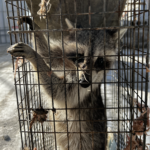Raccoons are often thought of as pests, but they actually play an important role in our diverse ecosystem. Here are some benefits that raccoons provide:
Raccoons are omnivores, which means that they eat a wide variety of plant and animal matter. This helps to control the populations of the plants and animals that they eat, preventing any one species from becoming too abundant.
Raccoons are known to be opportunistic feeders, which means that they will eat whatever is readily available. This allows them to survive in a variety of environments and helps to distribute seeds and nutrients throughout their range.
Raccoons are a food source for other animals, such as owls, hawks, and coyotes. This helps to support the populations of these predators and maintain a healthy balance in the ecosystem.
Raccoons are an important part of the ecosystem because they help to control the populations of other animals. For example, raccoons are known to eat rats and other rodents, which can help to prevent these animals from becoming a nuisance in urban areas.
In conclusion, raccoons provide a number of benefits to our diverse ecosystem. They are omnivores that help to control the populations of other animals, and they are an important food source for predators. Despite their reputation as pests, raccoons play an important role in maintaining a healthy balance in the ecosystem.









